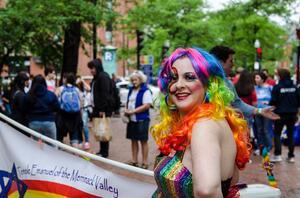Proud, Yet Ambivalent: Immigration Reform, Pride and the LGBT Community
Published originally by the Religious Action Center of Reform Judaism on June 11, 2013.
The very first Pride Parade took place on June 28th, 1970 in commemoration of the first anniversary of the Stonewall raid in New York City. The parade, almost a year in the making, was an opportunity for gay men and women to step out of the proverbial closet and respond as a community to the horrific attacks at the Stonewall Inn by proclaiming loudly and proudly that the gay community cannot be brought down. The courageousness and sheer strength of will in organizing this first Pride Parade cannot be overstated, as our country’s gay rights record in 1970 was not deserving of too much pride; sodomy laws were on the books and routinely enforced, discrimination was rampant, and gay visibility in the social and cultural landscapes was virtually non-existent, except as seen as a threat or a mockery.
Now 43 years hence, the LGBT community has grown in strength, in numbers and in visibility, and we have so much about which to be proud, as the arc of our country’s history bends more and more toward equality and justice for all. This is why every year I march with pride and with hope: pride in how far we’ve come, and hope that our trajectory will continue this trend.
This year, I can’t help but color my pride with a slight bit of ambivalence as a result of the failure of Senator Patrick Leahy’s amendment to the current Immigration bill, which would have recognized same-sex bi-national couples, affording them the same rights and benefits that opposite-sex couples obtain during the immigration process.
If you’ve been following the issue, you know that the RAC has been at the forefront of the campaign for comprehensive immigration reform, helping to mobilizing rabbis nationwide and educating congregants about the inherent Jewish values of welcoming the stranger. You’ll also know that the bill that just passed the Senate Judiciary Committee, as organized by the bipartisan “Gang of 8,” shows significant promise in the way of solid immigration policy, easing the process toward citizenship for many, allowing for the children of immigrants to attend college, and contribute to the good of society as they also work towards citizenship. Additionally, and perhaps most importantly, the bill seeks to keep bi-national families together as the non-American spouse or family member works toward obtaining their citizenship.
However, with the failure of the Leahy amendment, the definition of family has been disappointingly narrowed. As Senator Leahy himself proclaimed, “Discriminating against people based on who they love is a travesty,” and with the failure of this amendment, the fate of some 24,700 bi-national couples, along with over 267,000 undocumented LGBT immigrants, now hangs in limbo. As Human Rights Campaign President Chad Griffin wrote the other day “We owe it to [these couples] living in the U.S. today to get the job done.” As such, I am incredibly proud of the eight senators who came together to push this legislation forward, but I am also exceedingly saddened that they did so at the expense of so many LGBT families.
About a month ago, we celebrated the holiday of Shavuot, which commemorates מתן תורה, the giving of the Torah, along with the bounty of the Spring Harvest. As part of our celebration of Shavuot, tradition states we read from the Book of Ruth, which tells the story of Ruth, a Moabite woman who upon her husband’s death seeks to follow her mother-in-law Naomi, by becoming part of the Israelite community. She states, quite poignantly “כִּי אֶל-אֲשֶׁר תֵּלְכִי אֵלֵךְ, וּבַאֲשֶׁר תָּלִינִי אָלִין–עַמֵּךְ עַמִּי, ואלוהיךְ אֱלֹהָי” – “Wherever you go, I will go, wherever you rest, I will rest, your people will be my people, and your God will be my God.”
This text teaches us that we have an obligation to those who seek to join in our journey with us, whatever that journey may be. When God reminds us not to forget our status as strangers, as less than, as servants in the land of Egypt, this is what is meant; when God impels us to care for the widow, the orphan, the stranger, this is what is meant. And when God calls to us to be a light unto the nations, this is absolutely what is meant.
I am proud that our tradition shows such compassion for those who desire to join us, enriching and enhancing our community. It is our charge as Jews that we make sure that all those who wish to become part of our national fold are given that same compassion and care, and it is my hope that by next year’s Pride parade, our nation’s immigration system reflects exactly that charge.






